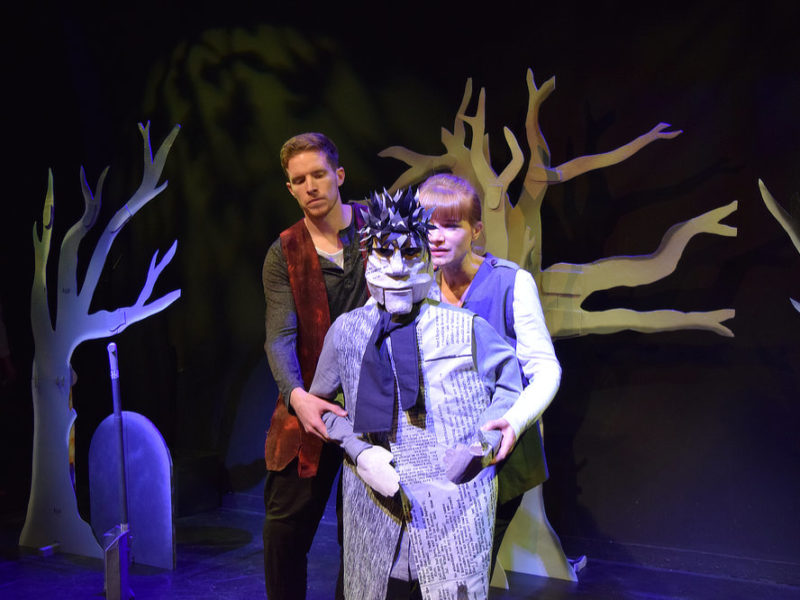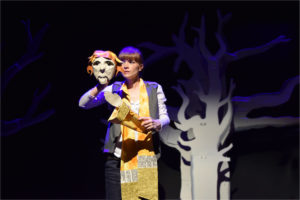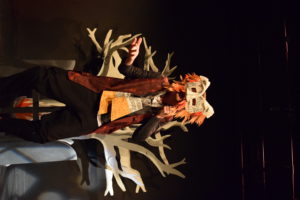Edinburgh Fringe 2019

Great Grimm Tales
Box Tale Soup

Genre: Adaptation, Puppetry, Storytelling, Theatre
Venue: Underbelly Cowgate
Festival: Edinburgh Fringe
Review
Great Grimm Tales is performed by Box Tale Soup – husband and wife team Noel and Antonia Byrne, Antonia’s brother, Sebastian Christophers, and his partner, Chloe Levis. Noel Byrne directs and rotates a performing role with Christophers and Levis.
The set is gorgeous. Jointed trees that look almost hand-like; a headstone that becomes in turn a window, a bell, a fire grate; a large trunk. And everywhere text, as if cut out of a storybook. The costumes too are beautifully cut – some asymmetric, one with epaulettes and single turn-back collar; ambiguous enough for multiple roles, yet hinting at characters – soldier, king, peasant, devil. And these too bear the same printed texture and text. The whole thing is reminiscent of one of Su Blackwell’s paper art books.
The puppets are beautifully made (by the Byrnes) and elegantly simple – a mask and a single hand suffices to turn a performer into a princess; a clever two-part mask creates a lion out of thin air and is later morphed into a beast.
The lighting (designed by Noel Byrne and operated on this occasion by Levis) is deft, with a few simple shifts used to create shadow or fire.
The physical theatre is artful and clever – a simple gesture seems to lift a character up; a pose struck turns performers into hanging corpses.
There is a poetic lyricism in the introduction delivered by the great teller of destinies himself, death (appearing as a gravedigger). The verbal delivery becomes a little more didactic as the numerous narratives demand, but there is a neat circular structure that gives us stories within stories, through which Box Tale Soup present a trio of Grimm tales and dark deeds.
And grim they are – the most visceral being the story of The Miller’s Daughter (played by Antonia Byrne) whose hands are chopped off by her father (Noel Byrne) at the insistence of the devilish ‘man with the red feathers’ (Christophers). She has been betrayed – her father professing to love her, yet choosing his own safety and wealth above her wellbeing. She leaves home, saying she can no longer stay. This is perhaps the show’s darkest moment, but if there is rage and disappointment, it goes unspoken.
The stories are entertaining, the deeds dark; yet they are sometimes delivered with a levity that somehow masks a darker heart.
The original soundtrack by Dan Melrose has hints of Americana. It is very effective in parts (especially when underscoring some on stage percussion using set and props), but its orchestration overwhelms at times. There is a song, used to underline the repeated meme of one story, in which it is hard to hear the singers – and its jollity diffuses the tension at a time when it felt needed.
Great Grimm Tales is a beautifully made show, and an entertaining hour of physical storytelling. Were it a little simpler, a little darker, it might be better still.
At Underbelly Cowgate at 11.00 until 25 August.




















































